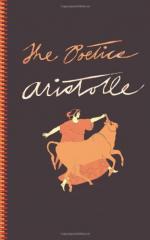
|
| Name: _________________________ | Period: ___________________ |
This quiz consists of 5 multiple choice and 5 short answer questions through Section II.
Multiple Choice Questions
1. What does Aristotle say about Homer's "Iliad"?
(a) It reminds him of a bad story.
(b) It lacks pity.
(c) It would not work in the format of a tragedy.
(d) It should be more tragic.
2. How does Aristotle say the different types of poetry emerged?
(a) Peers voted on their preference.
(b) The most talented poets decided on the different types.
(c) From non-fiction.
(d) From the personalities of different types of men.
3. Aristotle says what type of poetry imitates the "lower" types of men?
(a) Roman poetry.
(b) Greek poetry.
(c) Tragedy.
(d) Comedy.
4. In art, Aristotle defines the medium as what?
(a) The average.
(b) The manner in which the art is produced.
(c) A middle state or condition.
(d) The artist's spiritual inspiration.
5. Aristotle says that it's important for any poet to master what in a tragedy?
(a) The complication and unraveling.
(b) The middle of the story.
(c) The main character's life and death.
(d) The beginning of the story.
Short Answer Questions
1. According to Aristotle, how should the plot of a well-written tragedy be structured?
2. What example does Aristotle use to demonstrate his point of epic vs. tragedy formats?
3. What type of action does Aristotle say occurs without "Recognition" or "Reversal of Situation"?
4. Aristotle explains that the complication accomplishes what?
5. What does Aristotle identify as the most essential element of tragedy?
|
This section contains 312 words (approx. 2 pages at 300 words per page) |

|




